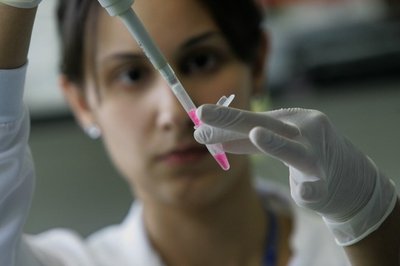Instead of assigning the usual summer reading to new students, the University of California-Berkeley tried something different this year by asking each incoming freshman and transfer student to send in a DNA sample for genetic testing and subsequent discussion. The move sparked a contentious debate about the ethics behind genetic testing, leading the university to significantly modify the experiment.

Ten years ago, scientists mapped the human genome in a feat that was called the most significant scientific discovery since evolution. Today, researchers continue to uncover secrets behind human DNA and how it functions.
Incoming students at the University of California-Berkeley were sent genetic testing kits so they could find out their tolerance for alcohol, lactose and folates. The project was modified significantly after the state of California intervened.
The DNA swab, dubbed “Bring Your Genes to Cal,” was meant to tell each student who volunteered his or her ability to metabolize lactose (found in dairy products), alcohol and folates. But, critics have questioned whether students are equipped to understand the results and whether their privacy is being breached.
Recently, maintaining that the assignment was technically medical testing, the California Department of Public Health told the university the DNA tests would have to be ordered by doctors and analyzed by certified laboratories. As a result, UC Berkeley will only present the collective results of about 1,000 participants at opening lectures for incoming freshmen, and no individual results will be provided.
 Critics of the project were afraid students who found out their alcohol tolerance was "normal" might be tempted to drink more.
University professors involved in the project say such questions would have been addressed during lectures planned to accompany the project. Moreover, they argue the genes chosen for testing were specifically selected to help students lead healthier lives according to their own needs. Students who learn they have difficulty metabolizing dairy products could avoid them, and those who know they need more folates (vitamins used to produce and maintain new cells) could get them from certain fruits and vegetables.
Critics of the project were afraid students who found out their alcohol tolerance was "normal" might be tempted to drink more.
University professors involved in the project say such questions would have been addressed during lectures planned to accompany the project. Moreover, they argue the genes chosen for testing were specifically selected to help students lead healthier lives according to their own needs. Students who learn they have difficulty metabolizing dairy products could avoid them, and those who know they need more folates (vitamins used to produce and maintain new cells) could get them from certain fruits and vegetables.

What would students have done with the results?
Part of the controversy over “Bring Your Genes to Cal” stemmed from the fear that students might not know how to interpret the results. For example, Hank Greely, the director of Stanford University’s Center for Law and Biosciences, told National Public Radio that students who saw they had a “normal” tolerance for alcohol might be tempted to drink more.

